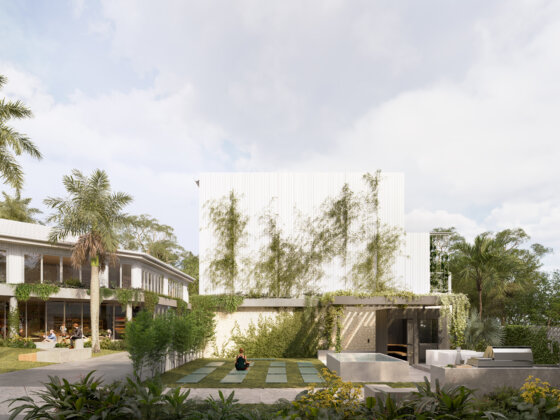
Olivia Argentini is the São Paulo Office Director at Marco Casamonti & Partners / Archea Associati and a board member of Green Building Council Brasil. She specializes in sustainable architecture, urban planning, and project management, with advanced education from São Paulo, Rome, and New York. She is one of the recipients of the honorable mentions for the International Architecture Awards for 2025 for the project Auris Residenze.
Archea Associati, founded in Florence in 1988 by Marco Casamonti and partners, is a leading international architecture firm with over 200 architects worldwide. Renowned for innovative projects rooted in context and materiality, the firm spans architecture, design, publishing, and research.

GDN: Can you please share some key equalities of the project?
Olivia Argentini: This project seeks to relate to the context in a way that is a little bit different from the other buildings. We noticed that in this place, which is called Balneário Camboriú, we have a beautiful beach and then a concrete forest on it. Sometimes, when you walk through the city and you don’t feel the smell of the sea, you don’t even remember that you are near it. We felt that this building had to bring back this connection to nature in some way. Many buildings in the area do not communicate with the public space. We wanted something, a building that would look like a living being, such as a plant or a tree. All these brise soleils that are on the façade, they are for us like leaves of this tree. Both elements serve as components of the façade; however, they also play a crucial role in protecting the façade itself and enhancing the well-being of the occupants within. This project has already gained the lead platinum seal and also the well seal, which is a certification that basically guarantees that the building is good in terms of use of health for the people who live there. We are truly delighted about this recognition.

GDN: So, can you please tell us what sets your architectural firm apart from others in terms of design philosophy?
Olivia Argentini: Marco Casamonti and Archea Associati is an architectural firm that was founded in Florence in 1988. We have 40 years of experience. In Brazil, we have been since 2011. We have 10, we’re going to have 11 in a short time, offices in the world, and we operate in more than 40 countries. Given our work across multiple countries, we place great importance on conducting extensive research. Specifically, we thoroughly study and learn about the country and the culture in which we are working. We integrate the knowledge gathered through our research with our Italian heritage, alongside the extensive experience accumulated throughout our professional careers. We maintain a global approach but remain grounded in our Italian roots. Therefore, I think this is a distinct difference.

GDN: So how receiving the award impacted your professional approach?
Olivia Argentini: We were extremely happy about the award, the Honorable Mention. We didn’t know what to expect because it’s not built yet, and we understand that unbuilt projects do not usually win prizes, so we are genuinely pleased. We acknowledge that this prize is recognized for its long-standing history and esteemed prestige. It’s a prize that holds significant importance, an international prize, and it was a great honor to participate in the highest level of competition. I believe the impact will be substantial, and it will enhance our ability to promote our firm more effectively.

GDN: Can you please tell us how do you envision the future of architecture in relation to urban development and technology?
Olivia Argentini: Firstly, we are faced with an urgent issue: the climate. It is no longer merely a climate crisis; it has evolved to a climate emergency. We, who work with construction, must endeavor everything that we can to improve the cities and the buildings and renovate the existing cityscape, because we know that one of the most sustainable things that you can do is to recover the city that needs to be refurbished. Also, nowadays, there are numerous technologies at our disposal to improve building functionality, which have a reduced impact on nature, on the health of people, hence, we must give them our full attention. And I believe that in the future, this is expected to emerge as the central theme.













